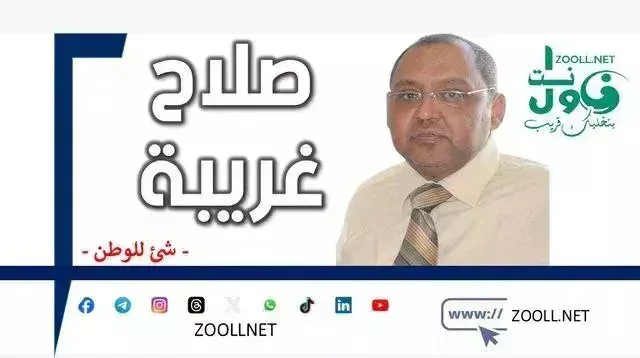The Sudanese Journalists Union between neutrality and political affiliation – Something for the Homeland – ✍️ Mr. Salah Ghariba

The Sudanese political scene is undergoing rapid transformations, and these transformations are reflected in many institutions, notably the Sudanese Journalists Union. Recently, we have seen a notable movement by a large number of trade unionists demanding an end to the union's membership in the “Coordination of Civil Forces” coalition. This decision raises many questions about the role assigned to the Journalists' Union or its counterparts, and its relationship with political work.
One of the fundamental principles on which any professional association must be based is the principle of neutrality and independence. Unions are institutions that represent the interests of their members and defend their professional and material rights. Therefore, its involvement in a political coalition would affect its ability to represent all its members equally and could lead to the marginalization of the opinions of some of them.
In the case of the Journalists' Union, neutrality is particularly important. Journalists are the guardians of the truth and are expected to be able to report events objectively and fairly. The union's bias toward a particular political movement would weaken public trust in the press and affect its ability to fulfill its oversight role.
Several reasons pushed a large number of members of the Journalists’ Union to demand the withdrawal of the “Taqaddum” coalition. The most important of these reasons is the preservation of the independence of the union. Supporters of withdrawal believe that the union's membership in a political coalition affects its independence and makes it a tool in the hands of that coalition. They guarantee the representation of all journalists and emphasize. that the union must represent all journalists without exception, and that it should side with a political movement. This can lead to the marginalization of the opinions of journalists who do not agree with this trend, thus preserving the image of the press. political work can affect the image of the press and make it appear as a tool in the hands of politicians.
The Sudanese Journalists Union faces great challenges in the current circumstances. On the one hand, there is strong pressure on him to align himself with a particular political movement, and on the other, he is asked to maintain his independence and neutrality.
The decision regarding the withdrawal of the Sudan Journalists Union from the “Taqaddum” coalition is a decisive decision and requires the union to take into account the interests of all its members and make a decision ensuring the preservation of its independence and impartiality. . The union must also work to strengthen communication channels with all its members and listen to their opinions and suggestions.
Maintaining the independence of the Journalists' Union is essential to guaranteeing press freedom and strengthening democracy in Sudan.
So why can this large number of unions, federations and associations that represent Sudanese journalists, and all these organizations be unified into a council that regulates the profession of journalism and sets certain standards for journalists, and reviews all restrictions of press and professional cards, and that this council is done by free and direct election after the formation of a specific committee with specific conditions? He seeks to train the board based on the specific controls and importance of the step?





